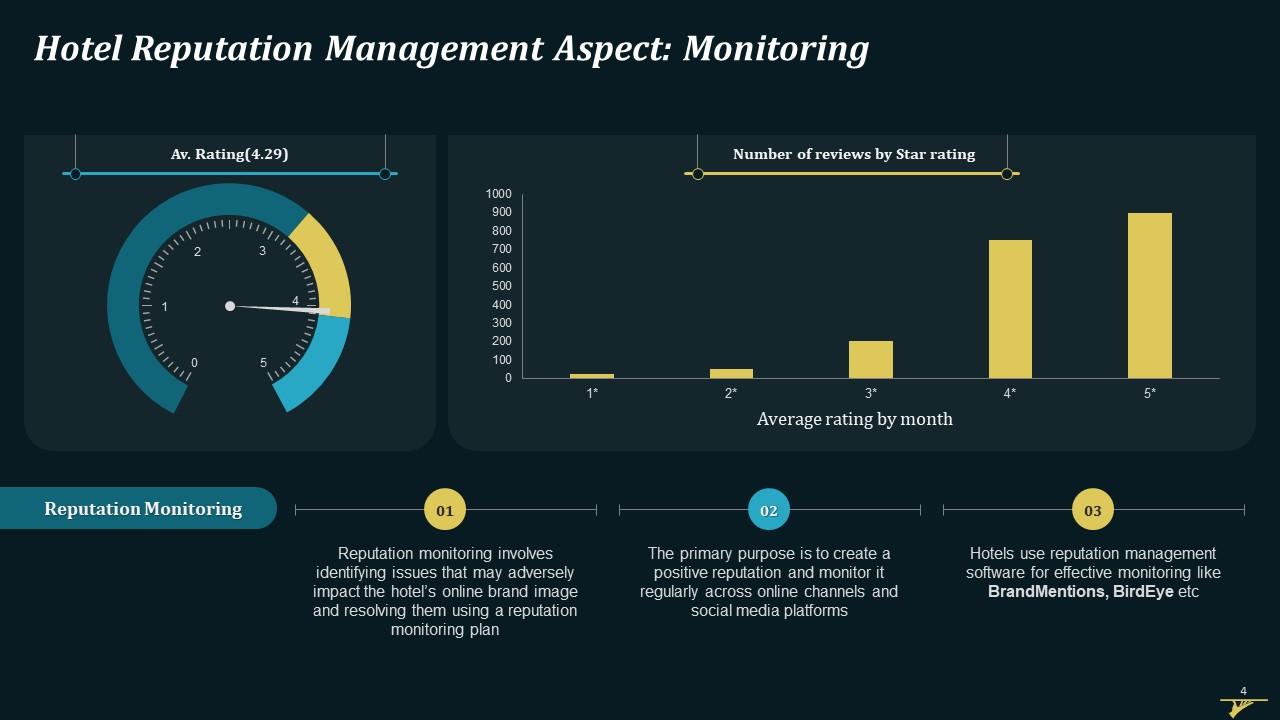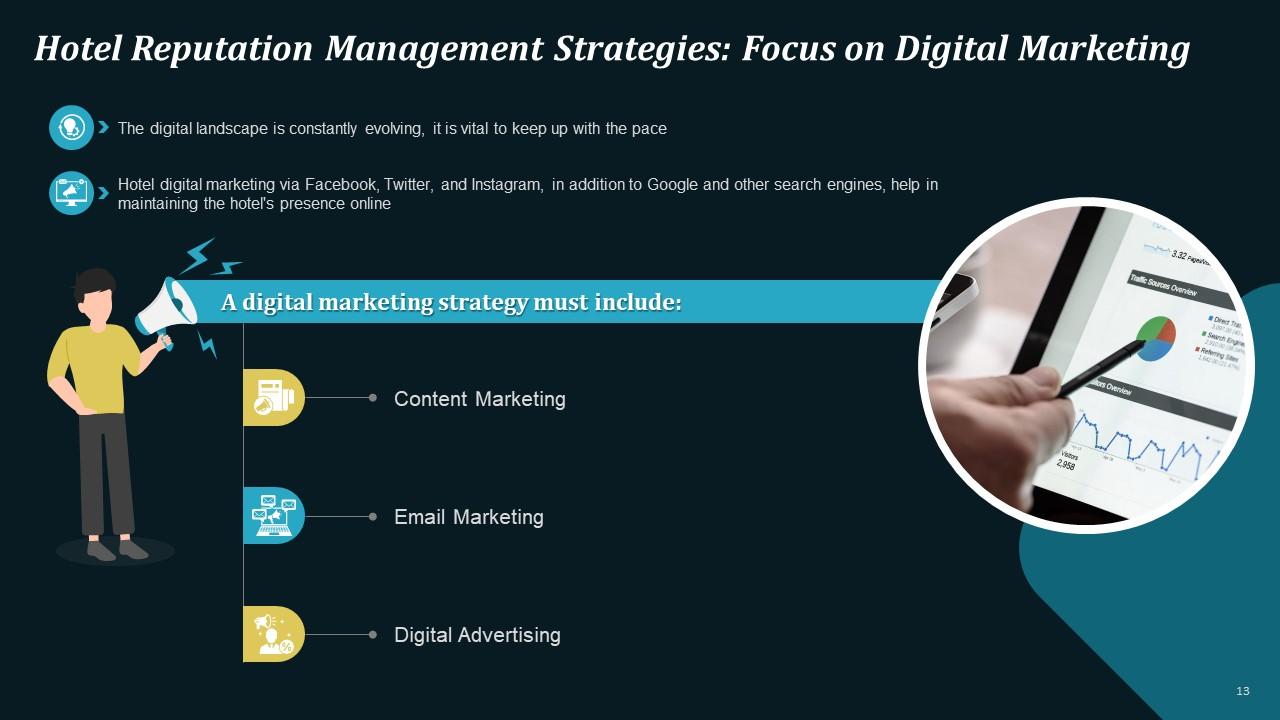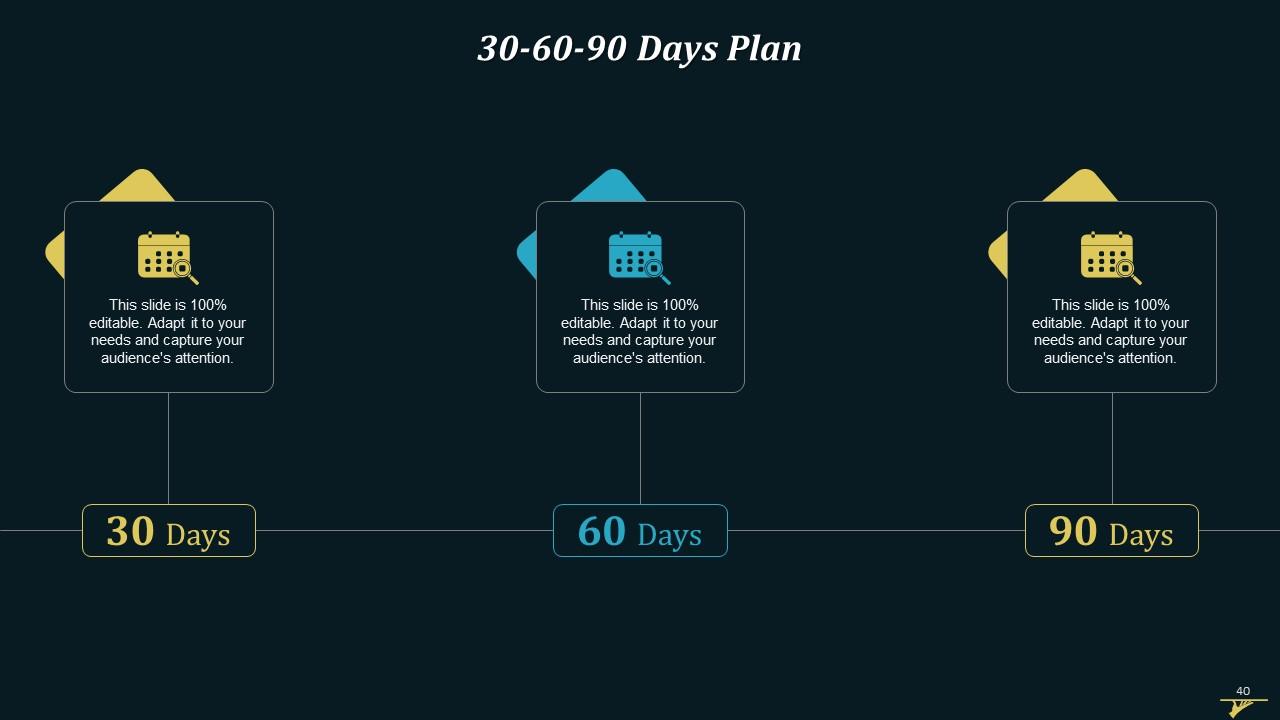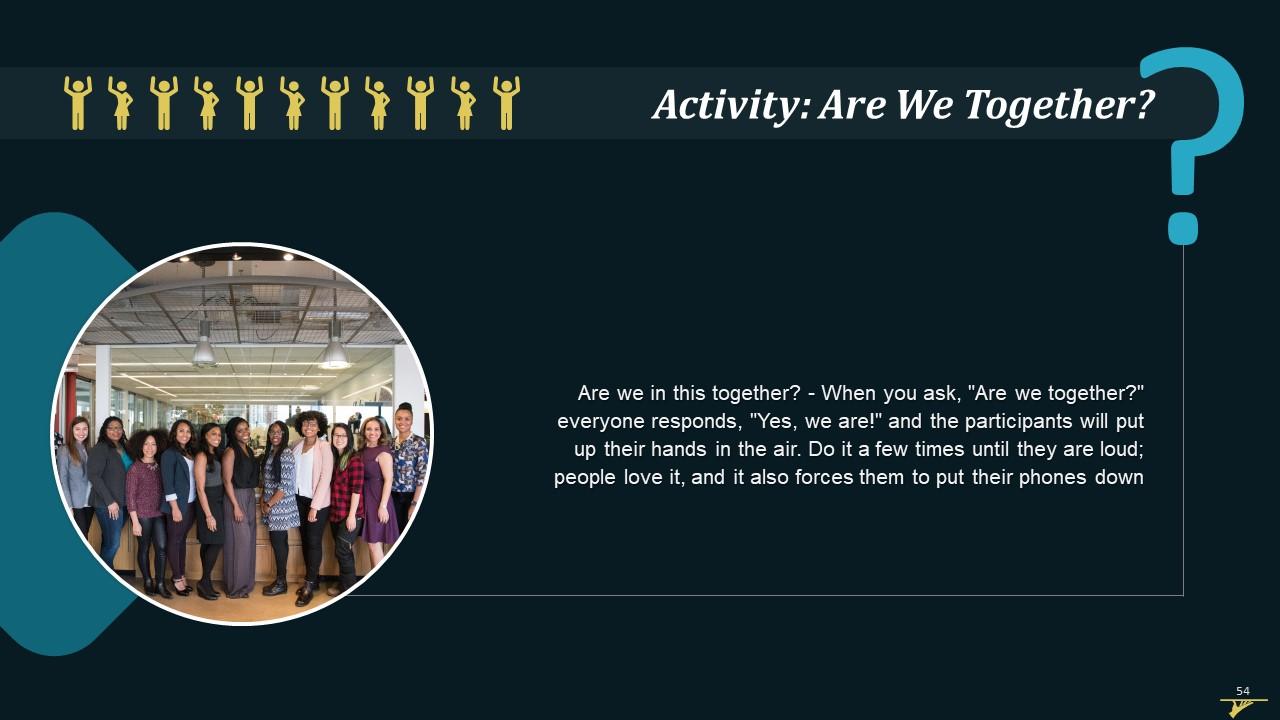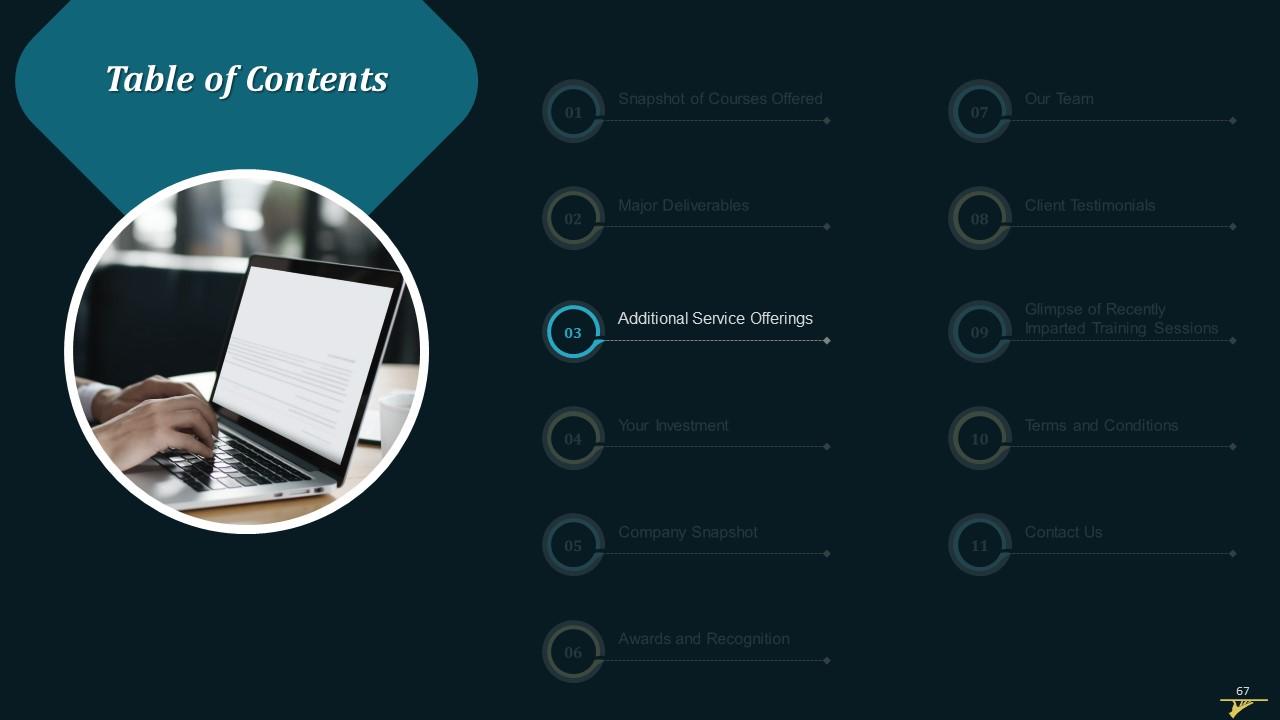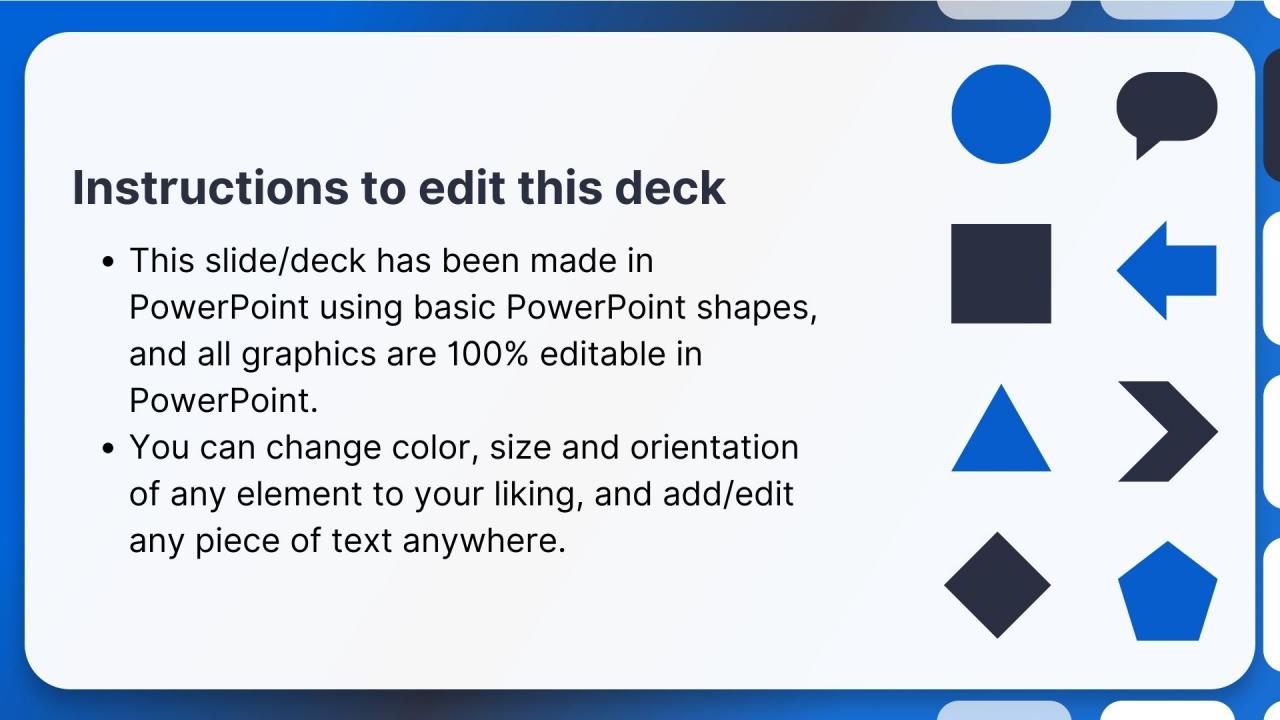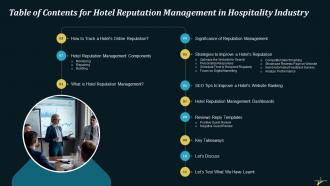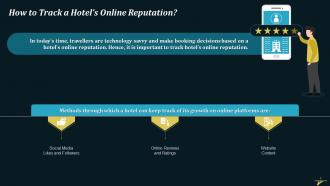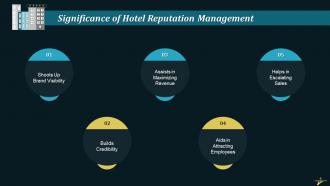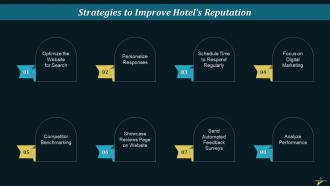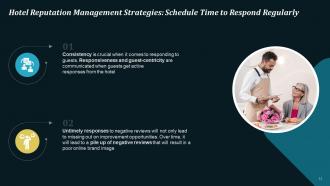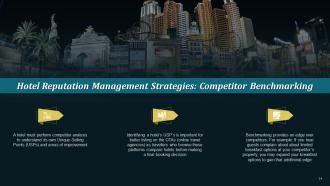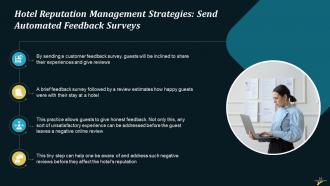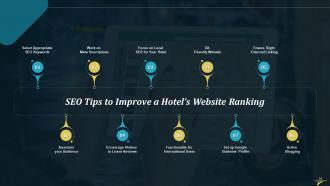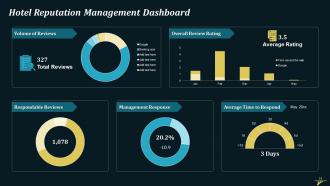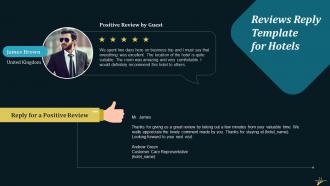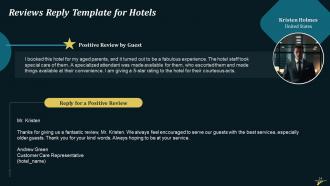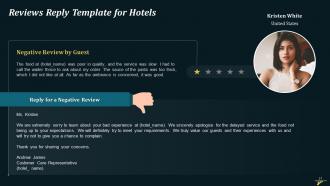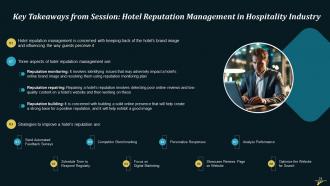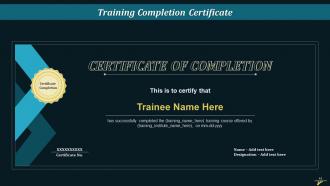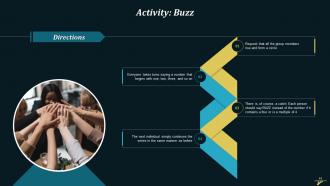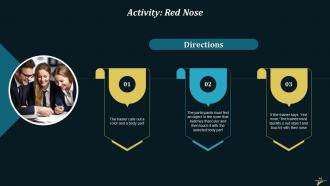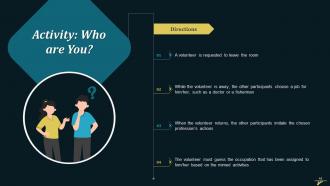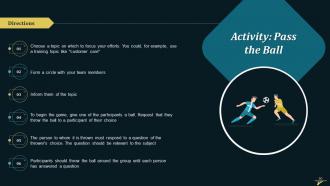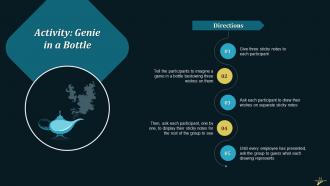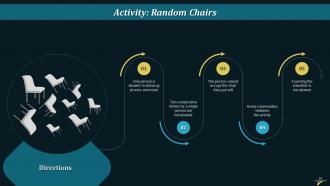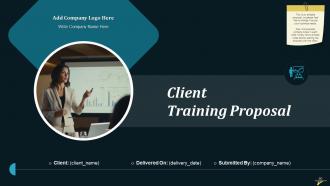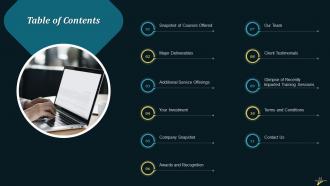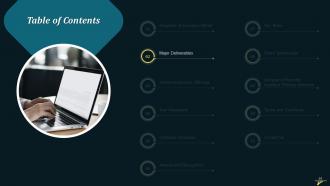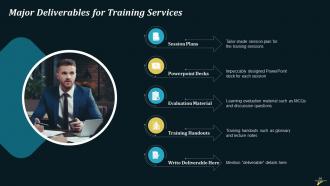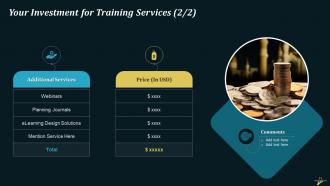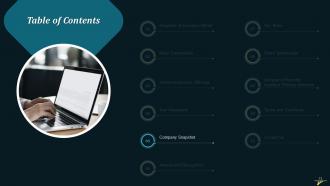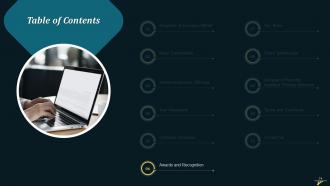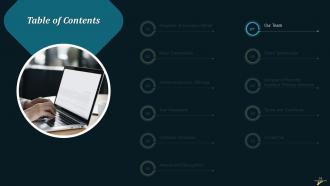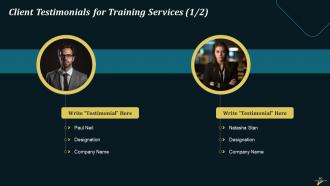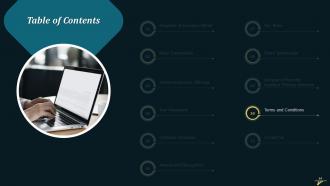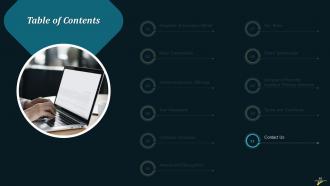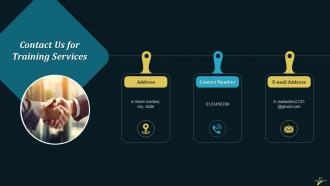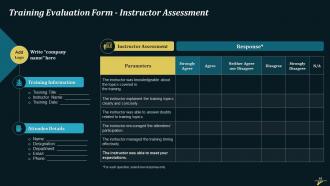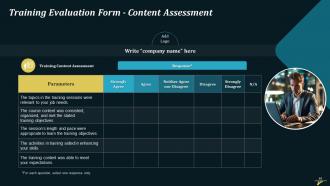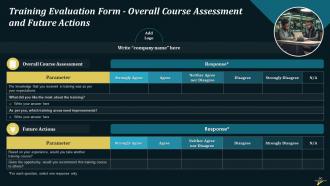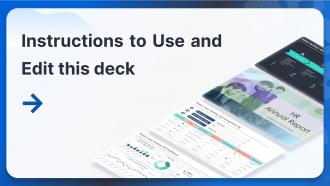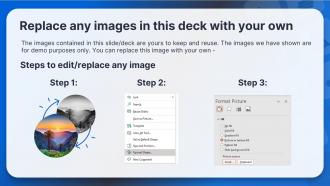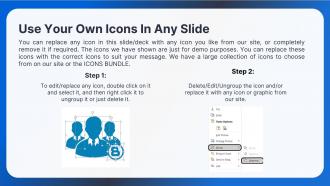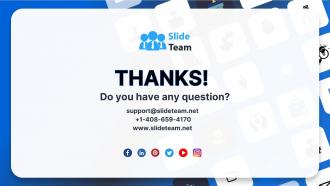Hotel Reputation Management In Hospitality Industry Training Ppt
This PowerPoint Training Module on Hotel Reputation Management in the Hospitality Industry illustrates techniques for tracking a hotels online reputation, followed by a deep dive into the core components of reputation management monitoring, repairing, and building. It elaborates on hotel reputation management and underscores its significance in todays digital age. The PPT Deck outlines various strategies to enhance a hotels reputation, including optimizing the website for search engines, personalizing responses to reviews, dedicating time for regular engagement, sending automated feedback surveys, and analyzing performance metrics. Additionally, it provides SEO tips for improving the hotels website ranking and introduces reputation management dashboards. With review reply templates for both positive and negative guest feedback, the module concludes with key takeaways and discussion questions, aiming to foster a proactive approach to maintaining and enhancing a hotels reputation.
You must be logged in to download this presentation.
 Impress your
Impress your audience
Editable
of Time
PowerPoint presentation slides
Presenting Training Deck on Hotel Reputation Management in Hospitality Industry. This deck comprises of 33 slides. Each slide is well crafted and designed by our PowerPoint experts. This PPT presentation is thoroughly researched by the experts, and every slide consists of appropriate content. All slides are customizable. You can add or delete the content as per your need. Not just this, you can also make the required changes in the charts and graphs. Download this professionally designed business presentation, add your content, and present it with confidence.
People who downloaded this PowerPoint presentation also viewed the following :
Content of this Powerpoint Presentation
Slide 3
This slide highlights the meaning of hotel reputation management which is monitoring its online brand image and influencing it so that guests perceive it in a positive way online. The three aspects of hotel reputation management are: reputation monitoring, repairing and building.
Slide 4
This slide contains information about the reputation monitoring that a hotel conducts with the primary purpose to create a positive reputation; online channels and social media platforms are monitored regularly as part of this activity.
Slide 5
This slide contains information about reputation repairing that involves detecting poor online reviews and low-quality content on a hotel’s website and proactively addressing these issues.
Slide 6
This slide contains information about reputation building that involves creating a solid online presence to build a strong base for a positive reputation. Projecting a good image attracts more traffic to a hotel’s website.
Slide 7
This slide contains information on methods to track a hotel’s online reputation which are social media likes and followers, online reviews and ratings, and website content.
Instructor’s Notes:
Techniques through which a hotel can keep track of its growth on online platforms are:
- Social Media Likes and Followers: Social media is responsible for making or breaking a hotel's image. A positive social media reputation can influence prospective guests’ decision to book a hotel
- Online Reviews and Ratings: Online reviews represent guests ‘opinions about their stay. Thus, proactively responding to positive and negative reviews is one way of tracking a hotel's online reputation
- Website Content: Stellar content that can cater to the target audience is one of the ways to improve a hotel's rankings. It helps in giving the guests fewer reasons to abandon the hotel's website while booking rooms
Slide 8
This slide illustrates the significance of reputation management for a hotel. It helps in escalating sales, building credibility, maximizing revenue, enhancing brand visibility, and attracting employees.
Instructor’s Notes:
The significance of reputation management for a hotel is:
- Shoots Up Brand Visibility: Positive reviews give a hotel opportunity to increase brand visibility, attract more guests and influence their booking behavior. It increases probability of room bookings
- Assists in Maximizing Revenue: Brand image and revenue that the hotel generates are interlinked. In today’s ultra-competitive market, the brand perception of guests has a direct impact on the revenue and other sales of the hotel
- Helps in Escalating Sales: These days, people rely on online reviews before making a final purchase decision, be it any product, a place, or a hotel they want to stay at. Hotels with negative reviews and a bad reputation lose out on guests and hence, miss out on big sales. Thus, good online reviews should be a point of focus for hotels as it tends to attract guests
- Builds Credibility: Social media platforms allow one to give an opinion; a negative opinion about the hotel will spread faster than a positive one. Also, no opinion is a sign of trust issues and unreliability. Having an effective strategy and addressing such issues will help hotels to build a positive image over a period of time
- Aids in Attracting Employees: The presence of professional and talented working staff is the foundation of a successful business, which a positive reputation of the hotel achieves. Good online image drives quality applications, in high volume, for job openings
Slide 9
This slide contains information about strategies that aid to improve a hotel’s reputation. These are: Send automated feedback surveys, schedule time to respond regularly, competitor benchmarking, focus on digital marketing, personalize responses, showcase reviews page on website, analyze performance, and optimize the website for search.
Slide 10
This slide highlights the strategy to optimize a hotel’s website for better hotel reputation management. Optimizing your website for search engines benefits the hotel's reputation. A high ranking indicates that the website is more likely to be found.
Instructor’s Notes:
A few SEO parameters to keep in mind for hotel reputation management are:
- Relevance: Make sure the content posted on the site is useful and relevant for making bookings at the hotel. This can be made sure with the help of keyword research, creating blog posts or informative articles, having up to date content, etc.
- Authority: Quality content attracts likes and shares from social media influencers that take the hotel's search engine marketing results to new heights. Creating content that goes viral generates referral links, manual outreach, and guest posting
- Discoverability: A hotel's website should have a user-friendly architecture to ensure visitors get what they want. For this, please focus on:
- Site speed: The website should be able to load quickly across types of mobile devices, or else visitors are likely to desert it
- Server Errors: Server errors include 404 and 500 errors, which might annoy visitors resulting in poor hotel image
- File naming: Correct and proper naming of photos, with the name of the hotel included is a must
Slide 11
This slide contains information about the method of giving personalized responses to guests for hotel reputation management. It creates an impression that the hotel is actively taking part in responding to the guests; whereas copy-paste responses create a negative image.
Slide 12
This slide showcases how the practice of responding timely to guests helps in maintaining the hotel’s reputation. Consistency is crucial when it comes to responding to guests. Untimely responses to negative reviews lead to missing out on improvement opportunities. It also causes a pile up of negative reviews resulting in a poor online brand image.
Slide 13
This slide contains information about digital marketing for hotel reputation management. Hotel digital marketing via Facebook, Twitter, and Instagram, in addition to Google and other search engines, maintains the hotel's presence online.
Instructor’s Notes:
A digital marketing strategy must include:
- Content Marketing: It is concerned with creating relevant and interesting content to build a hotel’s credibility among guests
- Email Marketing: Email marketing is the core of the digital strategy. Optimizing a hotel’s social media profiles, website, and mobile presence are some ways to enhance it
- Digital Advertising: Digital advertising across online channels help amplify awareness about the hotel among guests and increases customer loyalty
Slide14
This slide contains information about hotel competitor benchmarking as a strategy for hotel reputation management. As part of the concept, a hotel must compare itself to its competitors on facilities and service quality to understand one's strong points and areas of improvement.
Slide 15
This slide highlights the importance of showcasing reviews page on hotel’s website for better reputation management. Good testimonials, user-generated pictures, videos, or even interviews with guests can be highlighted on the website itself. This proves fruitful for building a good hotel reputation.
Slide 16
This slide highlights how automatic feedback surveys help monitor a hotel’s reputation management. By sending a customer feedback survey, guests will be inclined to share their experiences and give reviews and any unsatisfactory experience can be addressed in a proactive manner.
Slide 17
This slide highlights that analyzing hotel’s performance over time helps in hotel reputation management. In order to be effective, the hotel needs to track the response rate by guests, its ratings on websites that facilitate bookings (eg, Bookings.com, Hotels.com, etc.), check for common complaints or praises from guests, and its position in online rankings every month.
Slide 18
This slide showcases SEO recommendations to improve a hotel website’s ranking. These are selection of appropriate SEO keywords, working on meta descriptions, focusing on local SEO for your hotel, UX friendly website, ensuring right external linking, active blogging, setting up Google business profile, ensuring functionality for international users, encouraging visitors to leave reviews, and ascertaining your audience
Instructor's Notes:
SEO tips to improve hotel’s website ranking are:
- Select Appropriate SEO Keywords: It is important to choose appropriate short-tail and long-tail SEO keywords that specifically include hotel’s location names. Use keywords that best describe the hotel’s website and unique services offered by them
- Work on Meta Descriptions: While making bookings, users typically don't search by brand names but instead find hotels via geolocation suggestions. So, it's important to place location related long-tail and secondary keywords in the meta description. Catchy Meta descriptions can help catch the attention of potential guests with the generation of interest about the offerings
- Focus on Local SEO for Your Hotel: Local SEO is essential in the competitive hospitality industry, as many people looking for an accommodation only type in search phrases consisting of the name of the location and the word ‘hotel’. Optimizing the website for long-tail keywords enhances the chances of your hotel website reaching the interested audience
- UX Friendly Website: To keep the bounce rate (the rate of visitors leaving the hotel's website only after viewing one page) low, it should be ensured that the page has a responsive web design, fast loading, and can be browsed conveniently on smartphones and other devices. Unique photos of hotel areas can be added for the same
- Ensure Right External Linking: Right external linking is concerned with ensuring that backlinks to the hotel's page are placed on industry-related websites. It enhances Domain authority and Page Authority parameters for the hotel
- Active Blogging: A blog will help improve hotel’s brand recognition and reach new customers. Write blogs to provide the customers information about the menu, special offers, or special events taking place in the area
- Set up Google Business Profile: In order to reach more potential customers, a Google ‘My Business’ profile makes sure that the hotel's website is displayed in all possible locations. It allows hotels to manage their online presence across Google search and Google maps, through which visitors will be able to easily locate the hotel
- Functionality for International Users: More than one language version of the hotel's website is required if international visitors are also targeted. The hotel needs to adjust its content, currency and payment method to meet the global visitors' expectations. Google is the most-used search engine, but search engines like Baidu, Yandex, etc., are prevalent in some countries, where the hotel needs to optimize its website
- Encourage Visitors to Leave Reviews: Encouraging guests to leave reviews and replying to comments help build relationships with recipients to show that the hotel cares about their comfort. The guests can also be encouraged to recommend the hotel to their friends and family if they like the services provided by the hotel
- Ascertain your Audience: Understanding the target group can help the hotel learn about customer behavior, habits, and preferences. User personas can also be created to comprehend the information better
Slide 19
This slide includes a dashboard to track hotel guest reviews. The multiple KPIs showcased are volume of reviews, overall review ratings, respondable reviews, and the average time that the hotel management takes to respond.
Slide 20
This slide includes a dashboard to monitor guest reviews for hotel reputation management. The multiple metrics showcased are number of participants, booking sources and the overall Net Promoter Score (NPS).
Slide 21
This slide contains information about the reply template for a positive review that guest give to a hotel.
Slide 22
This slide showcases how hotel customer care representative should reply to an online positive review that a guest gives.
Slide 23
This slide showcases a response template that hotel staff can use to thank a guest for positive online review.
Slide 24
This slide includes a reply template that hotel customer care team can use to thank a guest for a positive review.
Slide 25
This slide contains information about the reply template for a negative review that a guest gives to the hotel.
Slide 26
This slide includes a response template toward a negative review that a guest gives to the hotel.
Slide 27
This slide showcases the reply template for a negative review given by the guest to the hotel.
Slide 28
This slide highlights the key takeaways from the session on hotel reputation management which the trainer can use to highlight vital learnings for the trainees.
Slide 44 to 59
These slides contain energizer activities to engage the audience of the training session.
Slide 60 to 87
These slides contain a training proposal covering what the company providing corporate training can accomplish for the client.
Slide 88 to 90
These slides include a training evaluation form for instructor, content and course assessment.
Hotel Reputation Management In Hospitality Industry Training Ppt with all 99 slides:
Use our Hotel Reputation Management In Hospitality Industry Training Ppt to effectively help you save your valuable time. They are readymade to fit into any presentation structure.
-
Amazing product with appealing content and design.
-
“Love it! I was able to grab an exciting proposal because of SlideTeam.”






